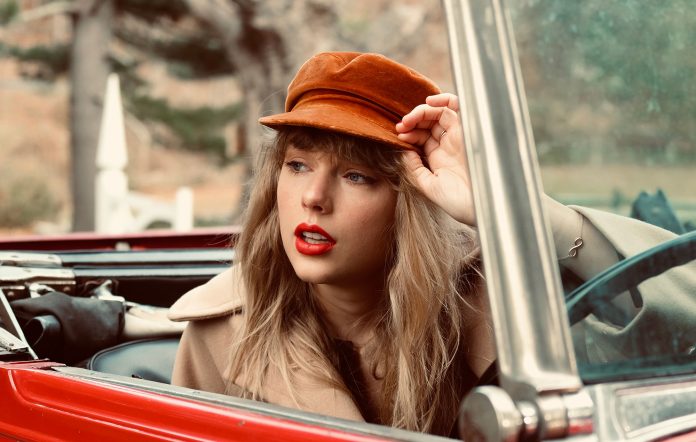This Slope is Treacherous… Unless You’re Taylor Swift in 2021
December 4, 2021
Taylor Swift meant it when she said, “[W]e’re happy, free, confused and lonely in the best way.” This past month, Swift made a splash with her newest re-recorded album Red (Taylor’s Version), receiving 90.8 million global opening-day streams on Spotify and breaking her own record that she had previously set with folklore. Within its first week of release, Red (Taylor’s Version) rose to the top of the Billboard charts and left listeners around the world speechless. A combination of fan-driven nostalgia and fresh, heartbreaking lyricism, Swift’s album has captured all of our hearts and taken us collectively back to the glory days of 2012.
Now with Fearless (Taylor’s Version) and Red (Taylor’s Version) under her belt, Swift has four more albums left to re-record in order to officially own all of her music. To non “swifties”, the action of re-recording and releasing past albums seems redundant- what does it mean for something to be “Taylor’s Version,” and why is this important?
Taylor Swift has something unique that separates her from many other popular artists: she has written every single one of her songs throughout her entire career, often by herself or with few collaborators. Her connection to her music is special, given that each lyric came from the depths of her own emotions and experiences as a young woman.
However, despite the deeply personal, rigorous work she has devoted to her catalogue, Swift does not have ownership over any of these songs. At the mere age of 16, she signed with Big Machine Records, to whom she released her first six albums (from Taylor Swift in 2006 through Reputation in 2017). Big Machine owned the master (aka the original) recordings of every one of the songs on those six albums.
While this type of ownership is common in record deals, her predicament became more complex in 2019 when Big Machine sold her discography to Ithaca Holdings, an entity owned by music manager Scooter Braun. Braun, notorious for managing people such as Justin Bieber and Kanye West (both whom Taylor Swift has had issues with in the past), has bullied Swift numerous times and has proven that he does not hold suitable respect for her nor her art. Braun then sold her catalogue to Shamrock Holdings for about $300 million, and he still continues to profit when her music is streamed or purchased.
In 2018, Taylor Swift switched labels from Big Machine to Universal’s Republic Records. In her contract with Republic, she owns the master recordings in her albums Lover, folklore, and evermore (as well as the ones she has re-recorded so far).
It is Swift’s belief that “[a]rtists should own their own work for so many reasons… But the most screamingly obvious one is that the artist is the only one who really knows that body of work.”
The combination of this notion and her negative opinion of Scooter Braun led her to publicly announce in 2019 that she would be re-recording her first six albums so that she could own them.
Swift has always had a close connection to her devoted fan base and has chosen to use these unprecedented circumstances as an opportunity to entertain and excite them. For each album, she is adding multiple additional songs titled “vault tracks,” songs that she wrote and recorded demos for back during the creation of the original album, but that didn’t end up making the album.
With these new/old songs have come hits like “Mr. Perfectly Fine” (Fearless Taylor’s Version) and even a 10-minute full version of the 2012 hit “All Too Well” on Red. “All Too Well (10 Minute Version)” recently made it to the #1 spot on the Billboard charts within weeks of the album’s release, marking it as the longest song to ever go #1 on the charts.
The additional success that Taylor Swift has gained from her re-recordings is truly a phenomenon. Her actions to reclaim her work also hold a valuable message for young artists in the music industry. Not only does it relay the significance of owning one’s work, but it also shows the importance of standing up for yourself and not letting people walk all over you. In an industry where constant injustice occurs under the table, this holds the utmost importance. I know that for myself, as a teenage girl who dreams of writing and releasing songs someday in her future, Taylor Swift’s endurance has been a huge source of inspiration and empowerment, not to mention an eye-opener on how the music industry really operates.
Ironically, rumors have arisen that Scooter Braun may be getting sued by Shamrock Holdings for misinformation. While negotiating the deal to sell Swift’s discography, he reportedly encouraged them that she would “not follow through” with her plans to re-record (a process that would ultimately cause them to make significantly less money from the original recordings).
In the end, she did follow through, and everything seems to be coming up Taylor these days (with the numbers to prove it!). As she once said in a 2016 interview with Vogue, “Karma is real.”




Cessa • Feb 9, 2022 at 1:45 pm
Yes Sof!!! Great article! Time to blast “message in a bottle”
Kiley Galvin • Dec 8, 2021 at 2:36 pm
Love this